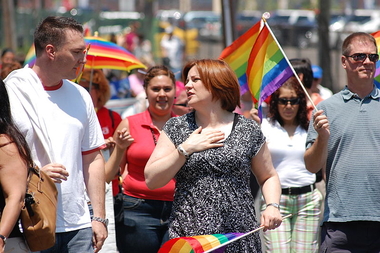Openly gay mayoral candidate Quinn won't march in NYC St. Patrick's Day parade

JENNIFER PELTZ, Associated Press
NEW YORK (AP) — She's a leading candidate to be New York's next mayor. She's already one of its top Irish-American officials.
Christine Quinn is also a lesbian and proud of it. And that's why the City Council speaker won't be marching in Saturday's St. Patrick's Day Parade, an event so entrenched in New York tradition that it's older than the United States.
Quinn's rising political prominence is bringing a decades-long dispute between parade organizers and gay activists back into sharp relief. And it's raising the prospect of an unprecedented standoff next year if she wins November's election and becomes the city's first openly gay and first female mayor.
Quinn, a granddaughter of Irish immigrants, says she's both saddened and mystified that the parade continues to bar marchers from displaying any gay-pride messages, a policy that has spurred protests and litigation going back to the 1990s. It has even prompted the launch of an alternative, gay-friendly St. Patrick's parade.
"I've marched in Dublin (in its St. Patrick's Day parade) with visibly identifiable stickers and buttons that made clear we were both Irish and LGBT," she said this week, using an acronym for lesbian, gay, transgender and bisexual. "If you can do that in Dublin, in God's name, why can't you do it on Fifth Avenue?"
Organizers say signs or buttons celebrating being gay would detract from the parade's focus on honoring Irish heritage. But gay people do march in the parade and are welcome, said Hilary Beirne, the parade's executive secretary.
"It's a shame that an issue is made of something that really is a nonissue," he said in an email message.
Dating to 1762, the parade has become a customary link in the city's political trail. This year's grand marshal is a scion of the Irish-American political pantheon: Alfred E. Smith IV, whose great-grandfather and namesake was a four-time New York governor and a presidential candidate.
Irish gay advocates sued in the early 1990s, after parade organizers refused to let them march with an identifying banner. Judges said the organizers had a First Amendment right to choose participants in their event. In the years since, gay activists have protested along the parade route.
Quinn, a former director of a gay and lesbian advocacy group, has never marched in the Fifth Avenue parade in her official capacity, although she attended it as a child, according to her office. She was elected to the City Council in 1999.
She plans to spend Saturday at a slate of other St. Patrick's Day events, including the mayor's annual breakfast reception and Mass at St. Patrick's Cathedral. She's also due to host the council's own tribute to Irish culture on Monday, with honorees including actor Liam Neeson.
Democratic mayoral candidates Sal Albanese, a former councilman; Public Advocate Bill de Blasio; and Comptroller John Liu also are boycotting the parade over its policy toward gay marchers. Former Comptroller Bill Thompson's campaign didn't immediately respond to inquiries Thursday and Friday.
Some Republican mayoral hopefuls will be in the ranks, including former Metropolitan Transportation Authority chairman Joseph Lhota and George McDonald, who heads an organization that helps the homeless. Both candidates have some Irish forebears, aides said.
"As he does every year, George McDonald is proud to celebrate his Irish heritage and the great tradition that is the NYC St. Patrick's Day parade," spokesman David Catalfamo said. Aides to Republican candidates Tom Allon and John Catsimatidis didn't immediately respond to inquiries.
Democrat-turned-unaffiliated candidate Adolfo Carrion, a former Bronx borough president, plans to march in a parade he sees as a celebration of Irish and other immigrants' contributions to the city, his campaign said. Carrion is running on the Independence Party line and seeking the Republican nomination.
Mayor Michael Bloomberg also is due to participate, though he has said the organizers should change their stance on gay marchers.
"My job as mayor nevertheless is to attend these parades, and I will continue to attend them — at the same time, while I am working as hard as I can to get the parade organizers to change," he said in 2011 .
Bloomberg, Quinn and other officials have become regulars at the St. Pat's For All parade, which happens in Queens and began in 2000 as an inclusive answer to the Fifth Avenue procession. About 2,000 people marched in this year's St. Pat's For All, founder Brendan Fay said.
"We're redefining the meaning of Irishness," said Fay, a documentary filmmaker who grew up Drogheda, an Irish port town about 35 miles north of Dublin.
Quinn said she'd be proud if her role in government helped resolve the dispute over the Fifth Avenue parade someday.
"To me, it is a very sad thing that so many other issues around LGBT issues — so many other complicated, complex, emotional issues — we have been able to make progress on ... but we are not able to come to a resolution on this," said Quinn, who married her longtime partner last year after lobbying to legalize gay marriage in the state.
"But I have to believe that sooner rather than later, we will be able to put this issue behind us."
___
Associated Press writer Jake Pearson contributed to this report.
___
Follow Jennifer Peltz at http://twitter.com/jennpeltz
Copyright 2013 The Associated Press.





